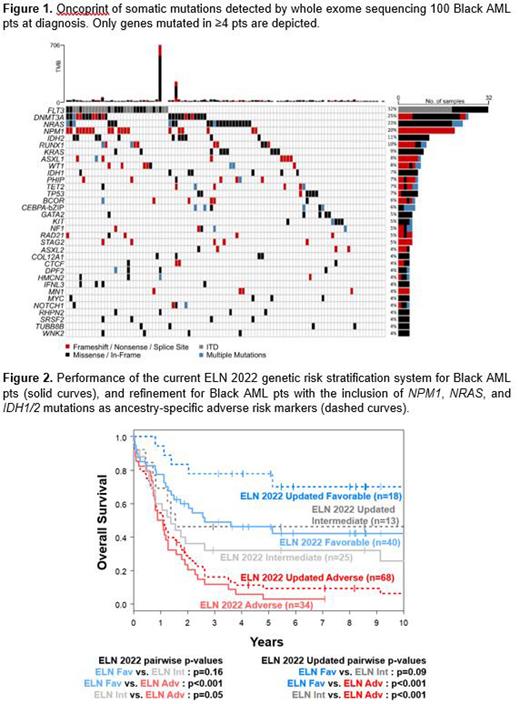Background
Our knowledge of the genomics of acute myeloid leukemia (AML), which serves as the basis of clinically used prognostic biomarkers and therapeutic advances (including targeted therapies), is almost exclusively based on data from patients (pts) of European ancestry.
Methods
We analyzed the exomes and transcriptomes of 100 Black AML pts at diagnosis who received intensive induction chemotherapy on Alliance for Clinical Trials in Oncology (Alliance) protocols. African Ancestry was confirmed by SNP analysis. We established their genetic landscape including somatic gene mutations, structural variants, gene fusions and associated gene expression. Somatic mutation frequency was compared to whole-exome sequencing of 741 White pts at diagnosis from the Beat AML cohort analyzed by identical workflow. Survival of Black pts was compared to 1,519 White pts treated on the same Alliance protocols. Multivariable analysis was used to identify clinical and molecular features associated with outcomes.
Results
We identified 162 recurrently mutated genes in Black AML pts. We detected different mutation frequencies for AML-associated genes based on ancestry, and mutations in genes not previously implicated in AML, including PHIP alterations in 7% of this cohort. 38 genes were mutated in 3-5% of Black pts but in <1% of White pts . Of the 162 recurrently mutated genes in Black pts, only 41 (25%) were recurrently mutated in White pts, while 121 genes (75%) were mutated in ≤1 White patient. Only 1/741 White AML pts did not have a mutation in at least 1/ 56 recurrently mutated AML genes assessed by clinical NGS panels. By comparison, 10% of Black pts had no mutations in these genes.
Analysis of gene fusions showed recurrent, cryptic CBFA2T3 fusions in 4 pts and a recurrent GGNBP2:: MYO19 fusion involving chromosome 17 not previously described in AML in 2 pts. The CBFA2T3 fusions did not cluster with CBF-AMLs by gene expression, suggesting biological differences.
t-SNE visualization of gene expression showed that Black and White AML pts clustered together by known driver mutations. We identified a t-SNE cluster enriched for pts with myelodysplasia-related (MR) mutations. Notably, Black pts in this cluster were significantly younger than White pts [50 vs 58-years (y), p=0.04], suggestive of intrinsic and/or extrinsic dysplasia-causing stressors.
When matched for age, performance status and study date, Black pts had higher relapse rates (63% vs 48%, p=0.05), worse disease-free (DFS, 3-y rates, 30% vs 47%, p=0.01) and overall survival (OS, 3-y rates, 31% vs 47%, p=0.007) compared to White pts. In a multivariable analysis, MR mutations (HR=2.06, p=0.03) and mutations in NPM1 (HR=2.29, p=0.009) and NRAS (HR=1.95, p=0.04) were associated with shorter DFS. Using the recently published iScore as a proxy for inflammation, we detected an enrichment of high inflammation in Black pts harboring NPM1 mutations compared to Whites (iScore high vs low; Black, 69% vs 31%, White, 45% vs 55%; p=0.08). Furthermore, when we classified pts into LSC17 prognostic groups, only 13% of Black pts in the prognostically favorable low LSC17 group were NPM1-mutated, compared with to 38% of White pts, suggesting ancestry-associated differences in the biological impact of NPM1 mutations. Mutations in IDH1/2 associated with shorter OS (HR=1.73, p=0.05) in Black pts identifying ancestry-specific risk markers. Finally, we show that the current ELN 2022 risk stratification system can be significantly improved by including NPM1, NRAS and IDH1/2 mutations as ancestry-specific adverse risk markers for Black pts ( Figure 2). Mutations in NPM1, NRAS, and IDH1/2 were enriched in a cohort of 43 Black relapsed/refractory (R/R)-AML pts via MSK-IMPACT supporting their adverse prognostic risk in Black pts.
Conclusions
Our work demonstrates ancestry-related differences in the genomic profiles of AML pts and calls for additional studies of ancestry-diverse populations to understand the landscape of somatic genetic alterations in AML. Further, our results emphasize the need to include ancestry-associated variants in clinical testing panels and to refine genetic risk assessment of AML by incorporating ancestry-specific prognostic biomarkers.
Support: U10CA180821, U10CA180882, U24CA196171; Clinicaltrials.gov Identifiers: NCT00048958, NCT00899223, NCT00900224. https://acknowledgments.alliancefound.org.
Disclosures
Walker:Karyopharm Therapeutics Inc.: Consultancy, Current Employment, Current equity holder in publicly-traded company. Mims:Jazz Pharmaceuticals: Membership on an entity's Board of Directors or advisory committees. Mundy-Bosse:Ikena Oncology: Research Funding. Stone:Abbvie: Consultancy. Paskett:AstraZeneca: Research Funding; Merck Foundation: Membership on an entity's Board of Directors or advisory committees, Research Funding; Guardant Health: Research Funding; Genentech: Research Funding; Pfizer: Research Funding; GlaxoSmithKline: Membership on an entity's Board of Directors or advisory committees. Levine:Mission Bio: Membership on an entity's Board of Directors or advisory committees; Isoplexis: Membership on an entity's Board of Directors or advisory committees; C4 Therapeutics: Membership on an entity's Board of Directors or advisory committees; Zentalis: Membership on an entity's Board of Directors or advisory committees, Research Funding; Ajax: Membership on an entity's Board of Directors or advisory committees, Research Funding; Prelude: Membership on an entity's Board of Directors or advisory committees; Auron: Membership on an entity's Board of Directors or advisory committees; Incyte: Consultancy; Qiagen: Membership on an entity's Board of Directors or advisory committees; Janssen: Consultancy; AstraZeneca: Consultancy, Honoraria; Novartis: Consultancy; Roche: Honoraria; Lilly: Honoraria; Amgen: Honoraria. Menghrajani:Gilead: Consultancy. Berger:PetDx and Eli Lilly: Consultancy; Grail: Research Funding. Tyner:Petra: Research Funding; Tolero: Research Funding; Meryx: Research Funding; Recludix Pharma: Membership on an entity's Board of Directors or advisory committees; Incyte: Research Funding; Schrodinger: Research Funding; Constellation: Research Funding; Genentech: Research Funding; Kronos: Research Funding; AstraZeneca: Research Funding; Aptose: Research Funding; Acerta: Research Funding. Eisfeld:Karyopharm Therapeutics: Other: spouse employment; Astra Zeneca: Honoraria, Other: CEI Advisory Board; OncLive: Honoraria.


This feature is available to Subscribers Only
Sign In or Create an Account Close Modal